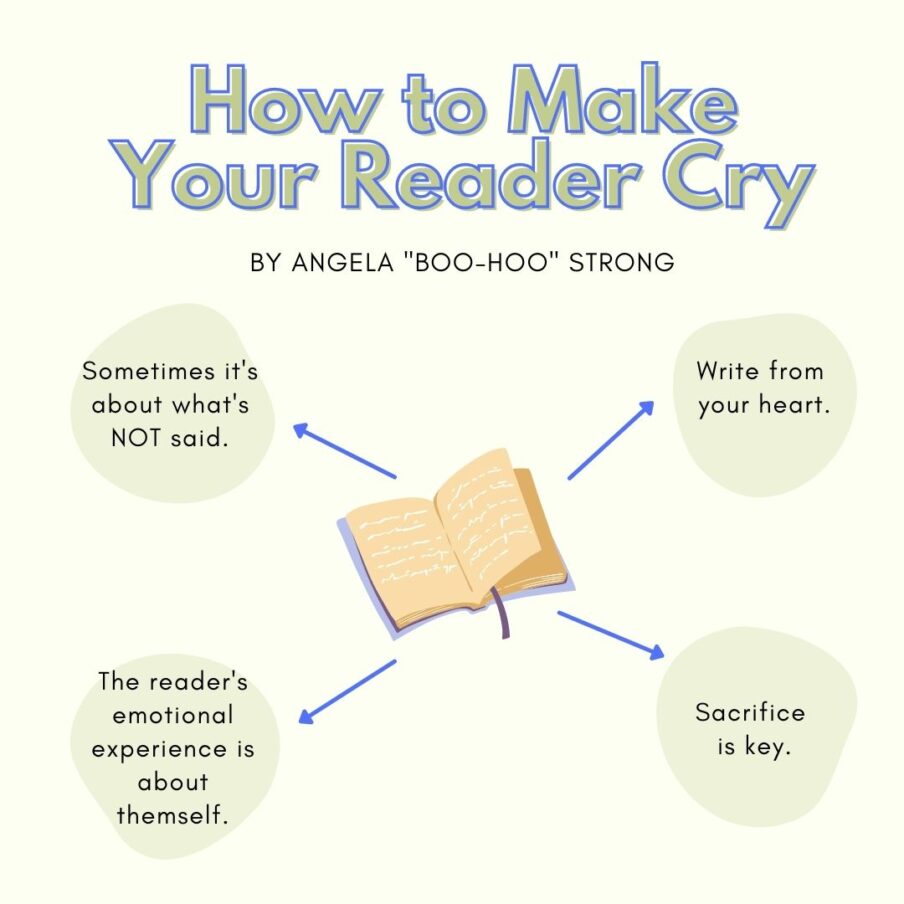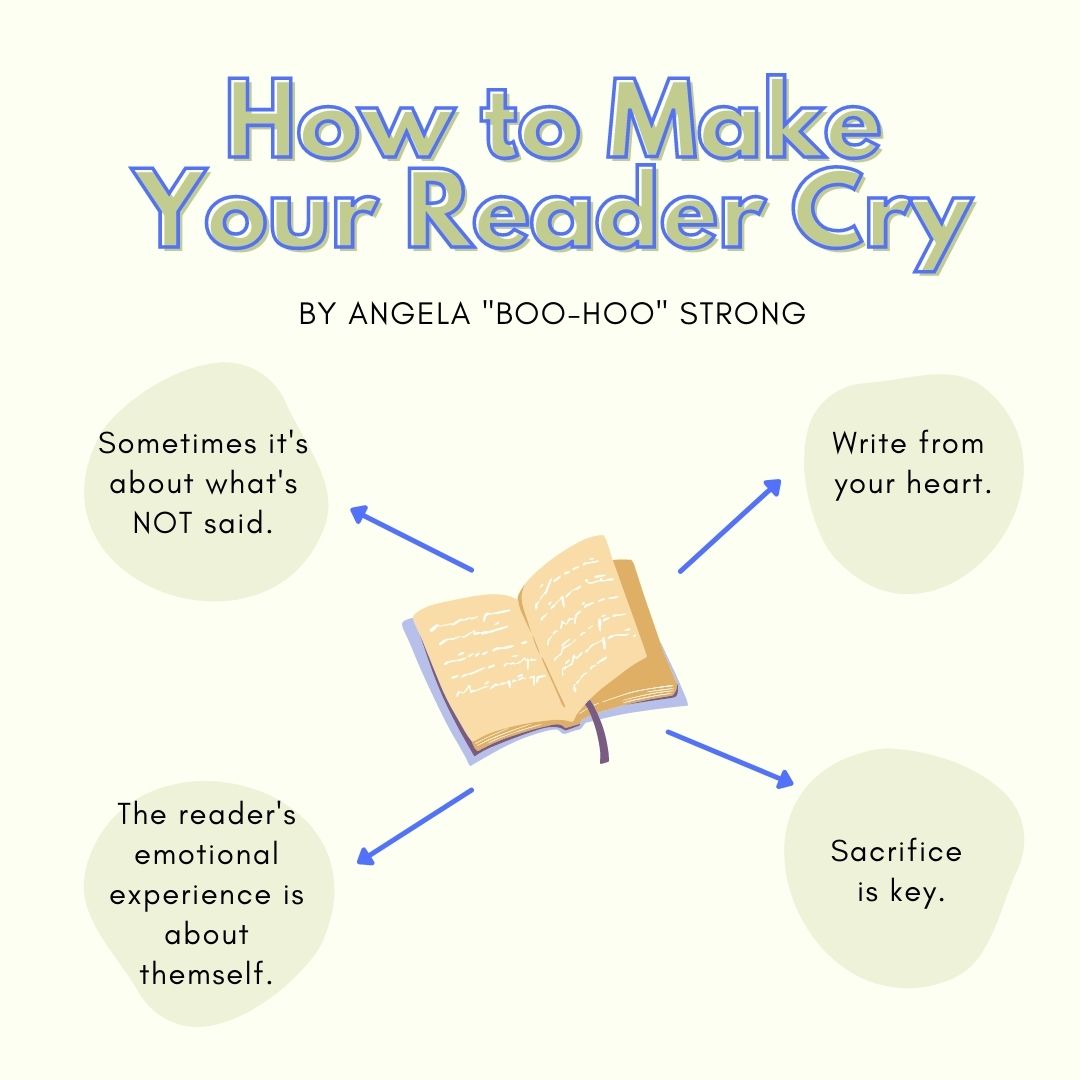by Angela Ruth Strong, @AngelaRStrong
Once I cried so much while reading a novel in bed that my husband had thought I’d fallen asleep and drooled on my pillow. But no. It was a puddle of tears.
I’ve never forgotten that novel (Rekindled by Tamera Alexander), and you can bet the same is true of all readers wrecked emotionally by a book. I’ve even heard an editor say, “If I cry, I buy.” So how does an author go about making a reader cry?
I asked a group of authors, and I got advice ranging from “pepper spray” to “show them their income tax return” to “jack up the price of your books.” There was also a lot of “kill off a character,” which may seem to make sense at first, except nobody died in Rekindled.
Then I got the advice, “No tears in the writer, no tears in the reader,” but I don’t necessarily agree. Sobbing in the shower over characters—yes, I’ve done this—is no guarantee my emotion will translate into words on a page. Furthermore, Robin Lee Hatcher, who is also known to make me bawl, says she doesn’t cry when she writes.
Another author pointed out, “Not everyone cries when reading books, no matter how authentic/emotional the scene.” Maybe I’m just a big baby. Or maybe the goal shouldn’t be to evoke tears but to connect.
I’d really been expecting the answers to be simpler. I wanted a list of steps. I was hoping for a light bulb to pop on over my head, suddenly giving me the skills to write tear-jerkers. It didn’t, but I can share what I learned.
- Sometimes it’s about what’s NOT said. Cynthia Ruchti gave the following example that made me want to cry. (Yes, I’m a big baby as I already admitted.) She said, in dialog, one woman could ask the other, “Did you get the results from your biopsy for cancer?” And rather than the sick woman responding, “Yes. I have cancer, and it’s fatal,” she could say, “Will you make sure my son has a good tenth birthday party?” The reader fills in the blanks with heartbreaking truth.

- Your reader’s emotional experience is not about the character so much as it is about themself. The reader isn’t going to cry just because they see the character crying. They are going to cry if they can relate. In my favorite television show Madame Secretary, the Secretary of State had to turn over a spy her husband was handling in order to keep the Russian president from killing thousands more. The spy was good, the Russian president was bad, the trade was unjust. I cried for three days because I was in a situation where I felt betrayed like the spy had been. It was never about him. It was about me. My husband felt the same way when watching the movie 42 where Jackie Robinson had to take the abuse if he was going to stay in the game. It wasn’t watching Jackie break the bat in the tunnel that affected Jim. It was about Jim wanting to break bats out of his own pain.
- Write from your heart. Most recently, the book Before I Called You Mine by Nicole Deese gripped me and wouldn’t let go. It’s about adoption, a subject dear to Nicole who adopted her daughter. She was told an adoption book wouldn’t sell, but she wrote it anyway. She explored her own quandaries and wounds and made herself vulnerable. I’ve never adopted, but, because her story was so authentic, I was able to relate from my personal experiences. I connected with her on a heart level before we ever met.
- Sacrifice is key. I believe a hero is wounded like a villain, but while a villain hides their wound with evil, the hero finds healing through self-sacrifice. I also believe that for a story’s message to be strong, it has to overcome the most powerful argument against it. Thus it has to involve sacrifice. In each of the examples given above, there’s a sacrifice required. A hard sacrifice made out of love.
The book Rekindled followed all four of these parameters for me as a reader. The hero had been a bad husband. After he barely survives a fire and is horribly transfigured, he returns home to find his wife attending his funeral. She thinks he’s dead, and she’s crying on the shoulder of a friend who he realizes would be a better husband for her than he’d been. In loving her enough to let her go, our hero becomes the man she deserves. I wanted to be loved that much, and I ached for the woman who didn’t realize she already was.
Your story doesn’t have to make someone cry in order to be memorable, but it does need to have impact. My feelings leak out in the form of tears, and that’s the kind of experience I want to offer readers. I definitely don’t want my stories to put them into such a sound sleep that they drool on their pillow.
In a world full of happily-ever-after love, Meri Newberg feels like the last young woman on the planet to be single, at least in her Christian friend group. So when she’s handed a strange present at the latest wedding–a 1950s magazine article of “ways to get a husband”–she decides there’s nothing to lose by trying out its advice. After all, she can’t get any more single, can she?
Her brother’s roommate sees the whole thing as a great opportunity. Not to fall in love–Kai Kamaka has no interest in the effort a serious relationship takes. No, this is a career jump start. He talks Meri into letting him film every silly husband-catching attempt for a new online show. If it goes viral, his career as a cameraman will be made.
When Meri Me debuts, it’s an instant hit. People love watching her lasso men on street corners, drop handkerchiefs for unsuspecting potential beaus, and otherwise embarrass herself in pursuit of true love. But the longer this game goes on, the less sure Kai is that he wants Meri to snag anyone but him. The only problem is that he may not be the kind of husband material she’s looking for . . .
Angela Ruth Strong sold her first Christian romance novel in 2009 then quit writing romance when her husband left her. Ten years later, God has shown her the true meaning of love, and there’s nothing else she’d rather write about. Her books have since earned TOP PICK in Romantic Times, been optioned for film, won the Cascade Award, and been Amazon best-sellers. She also writes non-fiction for SpiritLed Woman. To help aspiring authors, she started IDAhope Writers where she lives in Idaho, and she teaches as an expert online at WRITE THAT BOOK.




Comments 2
They say for a book to be memorable the reader needs to feel something, learn something, and see something in a different way. In addition to that, my goal is to make my readers laugh as well as cry, because if a book does that for me, I’m going to remember it and more than likely give it 5-stars. If a scene in my own books doesn’t effect some emotion from me, I don’t expect it to connect to a reader, either. I agree that often it’s actions rather than words that render emotion.
You are amazing, Angela Ruth Strong! I hope you get some more awesome story ideas, along with having a blast with your next journey!